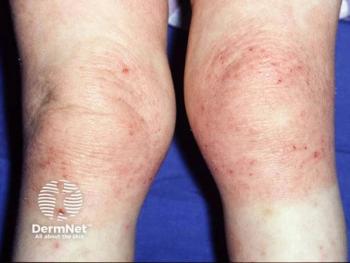
- Dermatology Times, April 2021 (Vol. 42, No. 4)
- Volume 42
- Issue 4
Ruxolitinib Cream NDA Accepted for Priority Review by FDA
Incyte announces the FDA has accepted the NDA for ruxolitinib cream for priority review. Ruxolitinib cream is a topical selective janus kinase (JAK)1/JAK2 inhibitor intended for the treatment of atopic dermatitis.
The FDA has accepted the New Drug Application (NDA) for ruxolitinib cream (Incyte) for priority review, according to a press release from Incyte. Ruxolitinib cream is a topical selective janus kinase (JAK)1/JAK2 inhibitor intended for the treatment of atopic dermatitis.1
The FDA’s decision is backed by phase 3 data from Incyte’s TRuE-AD clinical trial program, which evaluated the topical in over 1,200 patients, ages 12 years and older, who had been diagnosed with atopic dermatitis for at least 2 years and who were also candidates for topical therapy. The NDA also includes safety and efficacy data from a supplemental 44-week, open-label, long-term extension study of both TRuE-AD1 and TRuE-AD2.
“Incyte’s deep understanding of the pathways involved in immune-mediated skin conditions led us to investigate the potential for ruxolitinib cream to address key factors associated with atopic dermatitis, that is, inflammation of the skin and itch,” said Jim Lee, MD, PhD, group vice president, inflammation and autoimmunity, Incyte. “We are grateful to the people living with atopic dermatitis whose participation in our clinical trials helped generate the evidence to support this regulatory submission, and we look forward to working with the FDA as we seek to bring forward a new topical treatment for people living with this chronic skin disease.”
The primary endpoint of both studies was a proportion of patients achieving Investigator’s Global Assessment Treatment Success (IGA-TS), which is defined as a score of 0 (clear) or 1 (almost clear), as well as at least a 2-point improvement from baseline art Week 8.
Additionally, secondary endpoints of the studies included:
- a proportion of patients reaching at least a 75% improvement from baseline in the Eczema Area and Severity Index (EASI-75) score;
- a proportion of patients with a minimum 4-point improvement in the itch Numerical Rating Scale (NRS);
- a proportion of patients with at least a 6-point improvement in Patient-Reported Outcomes Measurement Information System (PROMIS) Short Form – Sleep Disturbance (8b) 24-hour recall score and;
- a mean percentage change from baseline in Scoring Atopic Dermatitis (SCORAD) score.
The TRuE-AD clinical trial program has also been examining the frequency, duration, and severity of adverse events linked to the use of ruxolitinib cream.
In the clinical trials, researchers studied patients with an Investigator’s Global Assessment (IGA) score of 2 to 3, and atopic dermatitis on 3% to 20% of their body surface area, excluding the scalp. These patients were randomized 2:2:1 into 1 of 3 treatment arms for a duration of 8 weeks. The treatment arms included ruxolitinib cream 0.75% administered twice daily (BID), ruxolitinib cream 1.5% applied BID, or vehicle cream. Following the conclusion of Week 8, patients were able to opt into a 44-week long-term safety extension study with ruxolitinib cream 0.75% or 1.5% applied BID.
The results of the trial were initially presented at the Revolutionizing Atopic Dermatitis (RAD) Virtual Symposium in April 2020. In these results, ruxolitinib cream demonstrated statistically significant reduction of itch compared to vehicle.
In TRuE-AD2, 39% of patients treated with ruxolitinib cream 0.75% and 51.3% treated with 1.5% met the primary endpoint compared to 7.6% of the vehicle group. Also, more than 51% of patients in the 0.75% group and 61.8% of patients in the 1.5% group achieved 75% improvement or more in the EASI score from baseline, versus 14.4% vehicle, according to the press release.3
Patients also experienced comparable rates of treatment emergent adverse events (TEAEs) in all three groups.
“Atopic dermatitis can have a profound impact on patients and their quality of life. I see a need for more treatment options that can improve itch and other symptoms that can lead to disruption in activities of daily living,” said Kim Papp, MD, PhD, founder and president of Probity Medical Research and the coordinating investigator for the TRuE-AD program, in a press release announcing the studies’ results.3 “I am encouraged by these data. The potential of ruxolitinib cream to become an important treatment option for patients living with atopic dermatitis is exciting.”
A decision on the topical’s approval is expected June 21, 2021, according to the company press release.
References:
- Incyte announces acceptance and priority review of nda for ruxolitinib cream for atopic dermatitis. Press release. Incyte. Accessed March 12, 2021.
https://investor.incyte.com/press-releases/press-releases/2021/Incyte-Announces-Acceptance-and-Priority-Review-of-NDA-for-Ruxolitinib-Cream-for-Atopic-Dermatitis/default.aspx - Hilton L. Ruxolitinib data positive for efficacy, safety. Dermatology Times. Accessed March 12, 2021.
https://www.dermatologytimes.com/view/ruxolitinib-data-positive-efficacy-safety - Incyte announces first presentation of phase 3 data from the true-ad program of ruxolitinib cream at the revolutionizing atopic dermatitis virtual symposium. Press release. Incyte. Accessed March 12, 2021. https://investor.incyte.com/press-releases/press-releases/2020/Incyte-Announces-First-Presentation-of-Phase-3-Data-from-the-TRuE-AD-Program-of-Ruxolitinib-Cream-at-the-Revolutionizing-Atopic-Dermatitis-Virtual-Symposium/default.aspx
Articles in this issue
over 4 years ago
Regenerative Medicine Gaining Popularityover 4 years ago
Combination Foam May Benefit Patients of Coloralmost 5 years ago
AI Diagnostics Fall Short in Skin of Coloralmost 5 years ago
Microneedling Strategiesalmost 5 years ago
Neuromodulators Combat Key Rosacea Challengesalmost 5 years ago
Baricitinib Demonstrates Positive Outcomes for Alopecia Areataalmost 5 years ago
COVID-19 Vaccine Refusal: Grounds for Termination?almost 5 years ago
Tazarotene Excels Across BMI Categoriesalmost 5 years ago
Solving Pierced Earring Challengesalmost 5 years ago
Emerging Agents Augment Melasma ModalitiesNewsletter
Like what you’re reading? Subscribe to Dermatology Times for weekly updates on therapies, innovations, and real-world practice tips.











